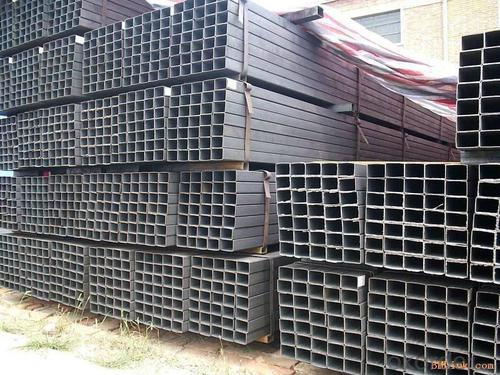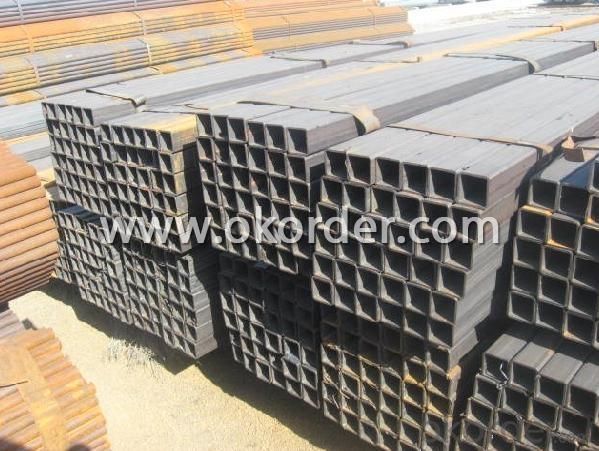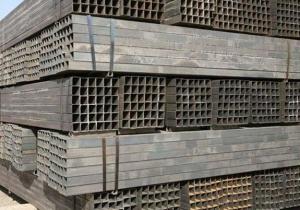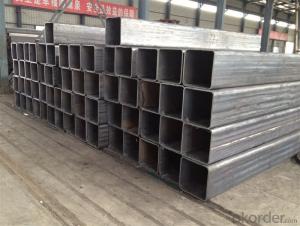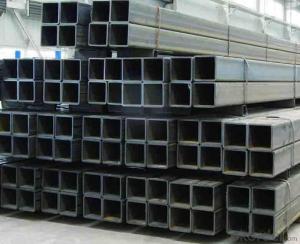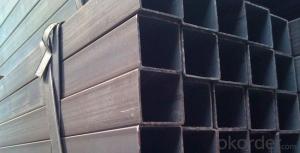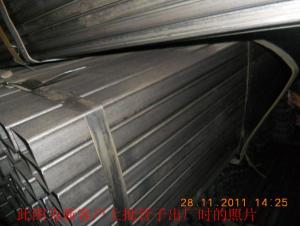Rectangle Tube ASTM A500 20*10-400*200 Hollow Section
- Loading Port:
- Tianjin Port
- Payment Terms:
- TT or L/C
- Min Order Qty:
- 50MT m.t.
- Supply Capability:
- based on order m.t./month
OKorder Service Pledge
OKorder Financial Service
You Might Also Like
1.Specification of Rectangle Tube ASTM A500 20*10-400*200 Hollow Section
1) Application: Widely used in building, machine, chemical equipment, automobile industrial, container, it is also applied to agriculture and mine machine.
2) Standard: ASTM A500, GB6728
3) Steel grade: ASTM A500: A, B, C; GB6728:Q195,Q215,Q235,Q345
2. Size of Rectangle Tube ASTM A500 20*10-400*200 Hollow Section
|
Size(mm) |
Thickness(mm) |
|
20×10 |
0.6-1.0 |
|
25×12 |
0.6-1.0 |
|
38×19 |
0.6-1.5 |
|
50×25 |
0.6-1.5 |
|
50×30 |
1.6-3.0 |
|
60×40 |
1.5-3.5 |
|
75×50 |
1.5-4.0 |
|
80×40 |
1.5-4.0 |
|
100×50 |
2.0-6.0 |
|
100×60 |
2.0-6.0 |
|
100×75 |
2.0-6.0 |
|
120×60 |
3.0-6.0 |
|
120×80 |
3.0-6.0 |
|
125×50 |
3.0-6.0 |
|
125×75 |
3.0-6.0 |
|
150×50 |
3.0-6.0 |
|
150×75 |
3.0-6.0 |
|
150×100 |
4.0-12 |
|
160×80 |
4.0-6.0 |
|
175×100 |
4.0-12 |
|
200×100 |
4.0-12 |
|
200×150 |
4.0-12 |
|
250×150 |
5.0-12 |
|
300×200 |
5.0-12 |
|
400×200 |
5.0-12 |
*Remark: Besides below sizes, we also can arrange production based on requirement of customers
3. Packing& Delivery
Packing Detail: Each in a PVC bag, bundle with knitted plastic bag, wooden case or according to customers' request
Delivery Time: 20-30 days upon receving prepayment or L/C
4. Data Sheet
Standard: ASTM A500
|
Chemical Requirement | ||||
|
Composition % | ||||
|
Grade A |
Grade B | |||
|
Element |
Heat analysis |
Product analysis |
Heat analysis |
Product analysis |
|
Carbon max |
0.26 |
0.3 |
0.22 |
0.26 |
|
Manganese max |
… |
… |
1.4 |
1.45 |
|
Phosphorus, max |
0.035 |
0.045 |
0.03 |
0.04 |
|
Sulfur max |
0.035 |
0.045 |
0.02 |
0.03 |
|
Copper, when copper steel is specified, min |
0.20 |
0.18 |
0.2 |
0.18 |
|
Where an ellipsis (...)appears in this table, there is no requirement | ||||
|
For each reduction of 0.01 percentage point below the specified maximum for carton, and increase of 0.06 percentage point above the specified maximum for manganese is permitted, up to a maximum of 1.50% by heat analysis and 1.6% by product analysis | ||||
|
Tensile Requirement | ||
|
|
Grade A |
Grade B |
|
Tensile strength, min, psi (Mpa) |
48000 (400) |
70000 (483) |
|
Yield strength, min, psi (Mpa) |
36000 (250) |
50000 (345) |
|
Elongation in 2 in. (50.8mm), min, % |
23 |
23 |
GB6728
|
Steel Grade |
Chemical Composition |
Mechanical Properties | ||||||
|
|
C (%) |
Si (%) |
Mn (%) |
P(%) Max |
S (%)Max |
YS(Mpa)Min |
TS(Mpa)Min |
El (%)Min |
|
Q195 |
0.06-0.012 |
0.3 |
0.25-0.5 |
0.45 |
0.5 |
195 |
315 |
22 |
|
Q215 |
0.09-0.15 |
0.3 |
0.25-0.55 |
0.45 |
0.5 |
215 |
335 |
22 |
|
Q235 |
0.12-0.22 |
0.3 |
0.3-0.7 |
0.45 |
0.45 |
235 |
375 |
20 |
|
Q345 |
0.20 |
0.55 |
1.0-1.6 |
0.45 |
0.45 |
345 |
510 |
21 |
5. Products Showroom
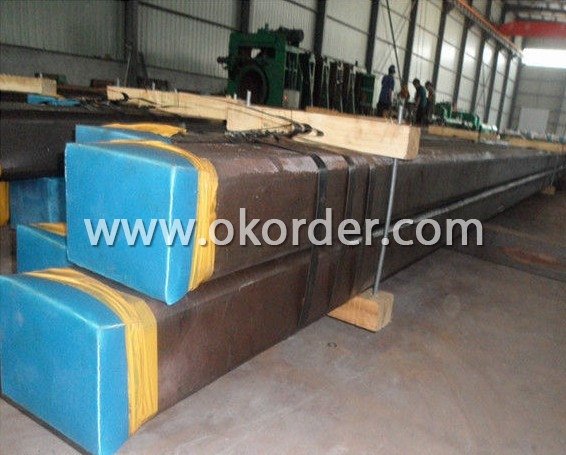
- Q: How are steel pipes used in the construction of wastewater treatment plants?
- Steel pipes are used extensively in the construction of wastewater treatment plants for various purposes. They are used for the transportation of wastewater from one unit to another, as well as for the distribution of treated water to different areas. Steel pipes are also used in the construction of the main water supply and drainage systems within the plants. Additionally, they are utilized for the installation of pumps, valves, and other equipment required for the treatment process. The durability and strength of steel pipes make them an ideal choice for the demanding and corrosive environment of wastewater treatment plants.
- Q: Can steel pipes be used for conveying chemicals?
- Yes, steel pipes can be used for conveying chemicals. Steel pipes are known for their high strength and durability, making them suitable for transporting various chemicals. Additionally, they are resistant to corrosion, which is crucial when dealing with corrosive substances. However, it is important to consider the specific type of chemical being transported and ensure that the steel pipes are compatible with it to avoid any chemical reactions or damage to the pipes.
- Q: Can steel pipes be used for water distribution networks?
- Yes, steel pipes can be used for water distribution networks. Steel pipes are commonly used for water distribution due to their durability, strength, and resistance to corrosion. They can efficiently handle high water pressure and are suitable for both underground and above-ground installations. However, proper protective coatings are necessary to prevent rusting and maintain water quality.
- Q: Are steel pipes resistant to impact?
- Yes, steel pipes are generally resistant to impact due to their high strength and durability.
- Q: How are steel pipes used in the manufacturing of agricultural machinery?
- Steel pipes are commonly used in the manufacturing of agricultural machinery as they are strong, durable, and resistant to corrosion. They are used to create the framework and structural components of various agricultural equipment such as plows, tillers, planters, and harvesters. Steel pipes provide stability and strength to these machines, allowing them to withstand heavy loads and operate efficiently in tough farming conditions.
- Q: How are steel pipes used in oil and gas industry?
- Steel pipes are extensively used in the oil and gas industry for various purposes such as drilling, transporting, and processing oil and gas. They are primarily used as casing pipes, which provide structural support and prevent the collapse of boreholes during drilling operations. Steel pipes are also used for transporting crude oil and natural gas from the wellhead to processing facilities or distribution points. Furthermore, they play a crucial role in the construction of pipelines for long-distance transportation of oil and gas, ensuring efficient and reliable delivery. Additionally, steel pipes are utilized in the construction of oil and gas refineries and petrochemical plants for various processes, including fluid transportation, heat exchange, and storage.
- Q: What are the applications of galvanized steel pipes?
- Galvanized steel pipes have a wide range of applications across various industries. They are commonly used in plumbing systems for water supply and drainage systems due to their corrosion resistance and durability. Additionally, they are used in the construction industry for structural supports, scaffolding, and fencing. Galvanized steel pipes are also widely utilized in agricultural irrigation systems and in the transportation of liquids and gases.
- Q: How are steel pipes insulated against heat loss?
- Steel pipes can be insulated against heat loss using several methods. One common method is through the use of insulation materials such as mineral wool or fiberglass wraps. These materials are wrapped around the pipes to create a barrier that reduces heat transfer. Another method is the application of insulation coatings, such as foam or rubber coatings, directly onto the surface of the pipes. These coatings create a protective layer that minimizes heat loss. Additionally, thermal tape or heat-resistant tape can be used to seal any gaps or joints in the insulation, ensuring a continuous barrier against heat loss. Overall, insulating steel pipes against heat loss is essential to maintain the temperature of the fluid or gas being transported and to increase energy efficiency in various industries.
- Q: How do steel pipes handle thermal expansion?
- Steel pipes handle thermal expansion by expanding and contracting with changes in temperature. When the pipe is heated, it expands in length and diameter, and when it cools down, it contracts. To accommodate this expansion and contraction, steel pipes are usually installed with expansion joints or loops that allow them to flex and absorb the thermal expansion without causing damage or stress on the pipe or its connections. This helps to prevent leaks, buckling, or structural failures caused by the expansion and contraction of the steel pipe.
- Q: Can steel pipes be used for drainage systems?
- Yes, steel pipes can be used for drainage systems. Steel pipes are durable, resistant to corrosion, and have high strength, making them suitable for carrying and managing the flow of water in drainage systems.
1. Manufacturer Overview
| Location | Hebei, China |
| Year Established | 1988 |
| Annual Output Value | Above One Hundred Million RMB |
| Main Markets | Main land; Southeast Asia; Middle East; Africa |
| Company Certifications | ISO 9002:2010;API 5L |
2. Manufacturer Certificates
| a) Certification Name | |
| Range | |
| Reference | |
| Validity Period |
3. Manufacturer Capability
| a) Trade Capacity | |
| Nearest Port | Tianjin |
| Export Percentage | 30%-50% |
| No.of Employees in Trade Department | 201-500 People |
| Language Spoken: | English; Chinese |
| b) Factory Information | |
| Factory Size: | 50,000 square meters |
| No. of Production Lines | Above 15 |
| Contract Manufacturing | Meicai Metal Trading Co.Ltd |
| Product Price Range | Average |
Send your message to us
Rectangle Tube ASTM A500 20*10-400*200 Hollow Section
- Loading Port:
- Tianjin Port
- Payment Terms:
- TT or L/C
- Min Order Qty:
- 50MT m.t.
- Supply Capability:
- based on order m.t./month
OKorder Service Pledge
OKorder Financial Service
Similar products
Hot products
Hot Searches
Related keywords


